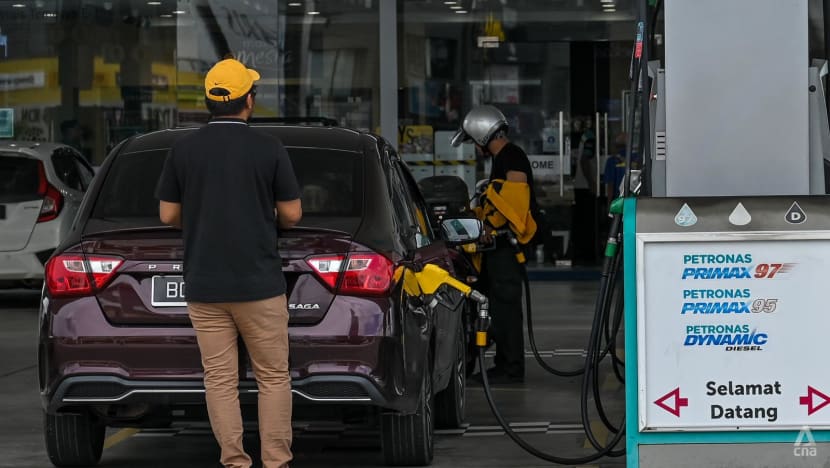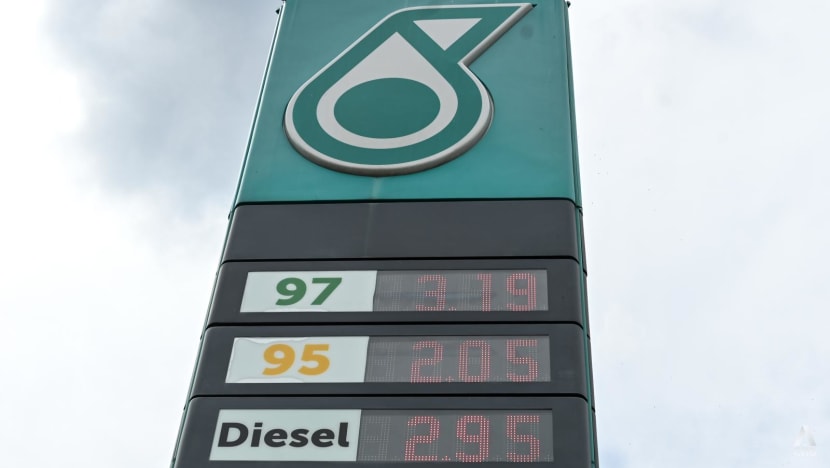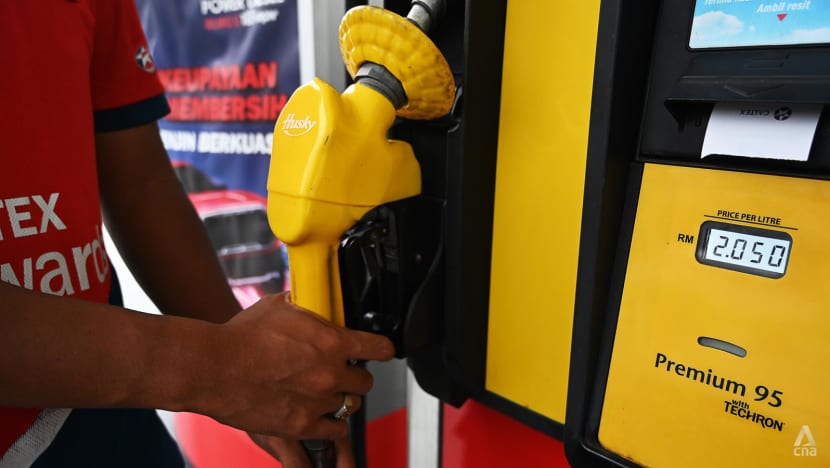analysis Asia
Criteria for Malaysia’s petrol subsidies to include property, luxury car ownership, but is it practical?
Analysts say the new factors announced by PM Anwar Ibrahim could complicate implementation of the targeted subsidies.


This audio is generated by an AI tool.
KUALA LUMPUR: Malaysia will factor in ownership of property and luxury vehicles when determining who qualifies for petrol subsidies, but analysts caution that this could complicate the implementation of a politically sensitive policy that has dogged the government and cost the ruling coalition votes.
Questions that arise include how the eligibility criteria will be enforced at the pump, and whether any extra costs of upgrading petrol stations for this task will outweigh savings from rationalising subsidies, the experts tell CNA.
Prime Minister Anwar Ibrahim told parliament on Tuesday (Aug 19) that the government is finalising the eligibility criteria and implementation mechanism for rationalising subsidies on its most common RON95 petrol.
“Additional criteria, including ownership of property and luxury vehicles, will be considered on top of monthly income before a final decision is made in end-September,” he said in a written reply to a question on RON95 subsidies.
Subsidy eligibility will be determined using various data sources, including income information from the Inland Revenue Board and the Department of Statistics’ Household Income Survey, said Anwar, who is also Finance Minister.
Anwar reiterated that the rationalisation would not affect at least 85 per cent of Malaysians, with only non-citizens and high-income earners expected to pay unsubsidised prices for RON95 petrol.
In response to CNA queries on what benchmark would be set for property and vehicle values in determining eligibility, as well as whether other factors such as the type of property or multi-vehicle ownership will be considered, a Ministry of Finance spokesperson said “everything is being considered”.
“As of now, we only refer to the PM’s answer in parliament,” the spokesperson added on Thursday.
When announcing measures aimed at lowering the cost of living on Jul 23, the premier said that the price of RON95 would be lowered from RM2.05 (US$0.49) to RM1.99 per litre for Malaysians eligible for subsidised petrol.
He added that the move would benefit 18 million citizens while addressing leakages to ineligible groups, including foreigners, noting that the price of unsubsidised RON95 remains at around RM2.50 per litre.
Malaysia-based author and economist Shankaran Nambiar told CNA that it appears the government plans to use a “multi-dimensional metric” to determine who gets subsidised petrol.
“Such a metric is useful for its comprehensiveness but invokes complexities in its implementation. The various data points can, however, be used to determine a cut-off point,” he said.
WHAT’S THE CUT-OFF POINT?
In rationalising petrol subsidies, Socio-Economic Research Centre Malaysia executive director Lee Heng Guie thinks the government will take a cue from how it removed diesel subsidies for peninsular Malaysia in June 2024.
After the subsidy removal leading to the price of diesel being floated, vehicle owners could qualify for cash assistance of RM200 a month if they met several criteria.
These include an RM100,000 annual income threshold and owning a diesel vehicle that is more than 10 years old.

For petrol subsidy eligibility, this annual income threshold could be set higher at possibly RM200,000, Lee suggested, noting that petrol vehicles are far more common and that Anwar has pledged that 85 per cent of Malaysians will qualify.
With data from the Inland Revenue Board, Road Transport Department and the Central Database Hub - which includes demographic data and specifics on education, health, household income and social assistance - Lee feels the government should be able to come up with appropriate benchmarks.
Even so, there will always be deserving people who miss out on the subsidies and vice versa, Lee said, calling them “errors of exclusion or inclusion”.
“You have to make sure it's efficient, but at the same time keep the administrative costs to the minimum. There's no perfect system in the sense that there will be those errors,” he said.
ENFORCEMENT AT THE PUMP
Recent statements from the Finance Ministry seem to indicate petrol subsidy rationalisation will go down a different route from that for diesel.
Second Finance Minister Amir Hamzah Azizan said in March that the mechanism for the targeted RON95 subsidies will involve a two-tier pricing system and the potential use of MyKad, or Malaysia’s identity card.
Amir Hamzah also said in July that the government was working on getting petrol station operators to upgrade their systems for the subsidy rationalisation scheme to ensure there would be no queues at the pump.
The objective is to ensure that customers can be screened for subsidy eligibility using their MyKad in a process that would not be too tedious compared to the current practice of pumping fuel.
Petrol Dealers Association of Malaysia (PDAM) secretary-general Bashir Ab Razak earlier told CNA that all major fuel brands are currently conducting pilot tests of the transaction mechanism at petrol stations “under close supervision by the authorities”.
“While we've been informed that the tests are progressing well, we do not have access to detailed insights at this point,” he said.
While PDAM has had preliminary discussions with government officials, the authorities seem to be doing technical and operational planning directly with the oil companies, Bashir said.
“As the frontline operators in this space, we believe it's essential for PDAM to be actively involved in shaping the implementation,” he added.
“We therefore look forward to a dedicated engagement session with the government, where we can share on-the-ground insights and recommendations to help ensure the rollout is both efficient and equitable.”
Lee from the Socio-Economic Research Centre warned that such a front-end system could impose additional costs on petrol station operators as compared to the “easier” method of floating RON95 prices and issuing cash assistance to eligible drivers thereafter.
“The intention is to make sure that the rich are not subsidised. But if you want to corner everything and get the perfect data to make sure everything is in place, sometimes it could either cause delays or more administrative costs,” he said.

Nambiar, the economist, said it would be “unwieldy” for authorities to issue petrol cards determined by factors like income and house ownership to all vehicle owners and have them produced at the pump.
“A more convenient mechanism would be to charge everyone at an unsubsidised level and to transfer cash rebates in the bank accounts of those who qualify for subsidised petrol,” he said, likening it to the diesel approach.
Lee called on the government to release more details on subsidy eligibility and implementation soon, highlighting that not much time was left until September.
“The data is all there,” he said. “There's no excuse for them to keep on saying that they are still studying it.”
TEST FOR ANWAR
Fuel subsidies are a politically sensitive issue in Malaysia, with Anwar’s ruling Pakatan Harapan coalition admitting that the diesel subsidy cuts had contributed to its loss in a Penang by-election last July.
In March, Anwar criticised the opposition for playing up the petrol subsidy issue, stressing that it would not affect the majority of the public.
RON95 subsidies cost the government almost RM20 billion a year in 2023 and 2024, the prime minister noted in July.
Given how the entire scheme of Malaysia’s fuel subsidies is “inefficient and not sustainable”, the best option financially would be to abolish it entirely, said Adib Zalkapli of the geopolitical consultancy firm Viewfinder Global Affairs.
“Of course that is politically impossible; Malaysians are addicted to cheap petrol. So in reducing the amount of money needed to keep petrol as cheap as possible to as many people, conditions like property and vehicle ownership must be set,” he said.
“And I think when you have multiple conditions to enjoy the cheaper petrol, loopholes will naturally emerge and they will be exploited.”











%20(5).jpg?itok=zM0TDBYg)






